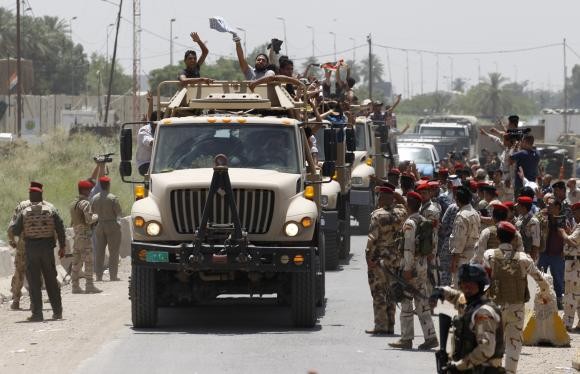The violence in Iraq shortly after the withdrawal of US troops sends a bleak note that even a country as strong as the United States could also fail in its foreign policy.
The rise of the Iraqi insurgents Islamic State in Iraq and the Levant (ISIS), their capture of several cities and their closing in to capital city of Baghdad is a big insult to what seems to be the highlight of President Obama's foreign policy before his first term ended: ending the war in Iraq.
But how is the violence in Iraq affecting the strength of America's foreign policy and its reputation as an international power?
In an interview with London's Independent Sir Ming Campbell, a former member of The Intelligence Security committee, said:
"If the Americans were to think that there was some activity or action which was going to directly impinge upon their interests then obviously in these circumstances a military intervention might come up the agenda."
Sir Ming underscored that the tug-of-war between the leftist and the rightist in Obama's government are the problem.
"The left who were really opposed to military action against Iraq whilst the right are isolationist and for Obama to find any kind of public consensus over military action would be very difficult indeed. He's got a big election in October and risks losing the senate, in which case his next two years will be total stalemate. Domestic American politics will be as influential as any kind of strategic view," Sir Ming explained.
One of the highlights of President Obama's first term was ending the war in Iraq in 2011, accomplishing one of the major highlights of his campaign. But with the Islamic militants advancing towards Baghdad and already capturing several cities and towns, many critics have been quick to point out that the president's foreign policy has actually failed. Worst, it might even damage his legacy.
According to CBS News National Security Analyst Juan Zarate, former national security adviser to President George W. Bush, the violence in Iraq stemmed from 2011, the year the United States pulled out its troops, when Prime Minister Nouri al-Maliki refused to remaining U.S. forces to stay behind.
Al-Maliki was criticized for weakening the Iraqi government as well as the armed forces. As leader of the Shiite government, al-Maliki did little to unite the country by integrating the Sunni and Kurdish minorities, reports CBS News.
Also, the civil war in neighboring Syria, has also contributed to the current chaos in Iraq. Syria has become a breeding ground for extremists groups, ISIS. The U.S. did little, though, to prevent the Syrian crisis from worsening. August last year, President Obama announced his intention of asking Congress to send military troops to Middle East, although he later abandoned that plan and instead opted to tackle the issue diplomatically, but to no avail.
It is indeed true that American advances during the war in Iraq could end up useless if ever ISIS wins in this chaotic power struggle. Likewise, the group's advance will likely haunt President Obama throughout the rest of his term. Questions over whether U.S. forces should have stayed behind, to what extent might Obama have altered the course of events in the past years, or whether similar policy in Afghanistan is doomed for failure, will definitely run in the minds of Obama critics if Iraq falls into the hands of insurgents.
Political analysts and experts are one in their opinion that President Obama could have definitely changed the course of Iraqi politics had he done something different in the past, like insisting on letting US troops stay a little bit longer. However, differing ideas float as to what extent should he bear the blame for this debacle.






















